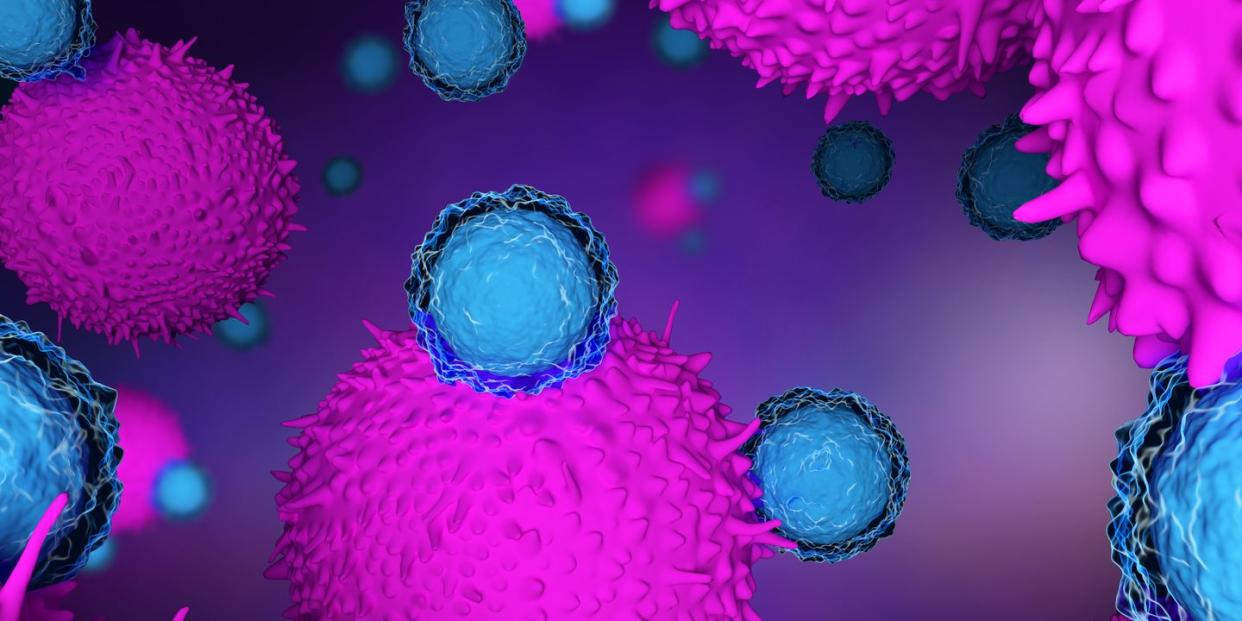Immunotherapy Is the Next Wave in Cancer Treatment. How Effective Is It?

For decades, the most effective treatments for cancer have involved surgery and rounds of chemotherapy or radiation. But some of those treatments can harm healthy cells, which is why advancements that harness the power of the immune system are a big deal.
“Some patients have truly remarkable responses to immunotherapy that last for years—in some cases so many years that we think these patients may even be cured of their disease,” says Ezra Cohen, M.D., codirector of the Precision Immunotherapy Clinic at UC San Diego Health. This therapy doesn’t work for every cancer yet, but here’s the latest:
What is immunotherapy and how does it work?
Normally the immune system attacks anything foreign to the body, such as viruses and bacteria. But because cancer starts in noncancerous cells, the immune system doesn’t always see it as dangerous.
“The goal of immunotherapy is to teach the immune system to recognize and kill cancer cells,” says Aung Naing, M.D., a professor of investigational cancer therapeutics at the University of Texas MD Anderson Cancer Center in Houston.
The most common type of immunotherapy for cancer involves checkpoint inhibitors, drugs that take the brakes off an immune response that’s already underway, unleashing its full power. With chimeric antigen receptor (CAR) T cell therapy, doctors take T cells from a patient’s blood, engineer them to target the tumor, and return them to the patient to attack the cancer.
Scientists are also developing vaccines—not just ones that prevent cancer, like the HPV vaccine, but also ones that boost immune response. And to ramp up the assault on cancer, they’re creating monoclonal antibodies, versions of the body’s own disease-fighting antibodies, in the lab.
What types of cancer does immunotherapy treat?
So far it’s patients with several hard-to-treat cancers (including melanoma, head and neck cancers, and kidney, bladder, and non-small-cell lung cancer) who have benefited most from immunotherapy. “These types of tumors are considered ‘hot’ because the immune cells in them can be activated,” Dr. Naing says. “They respond well to immunotherapy.”
Other cancer types, such as colon and pancreatic cancer and most breast cancers, are considered severely immunosuppressive or “cold,” but researchers are starting to see success by combining immunotherapy with traditional treatments.
The FDA recently approved the first immunotherapy for breast cancer after a checkpoint inhibitor (called atezolizumab) combined with chemotherapy was shown to have significant effects. It’s now a first-line treatment for some women with breast cancer tumors that are triple-negative—an aggressive and particularly deadly form of the disease. A monoclonal antibody called pembrolizumab was also approved along with chemotherapy for certain types of early-stage triple-negative breast cancer.
How effective is immunotherapy?
Researchers are trying to understand why immunotherapy agents work for only about 20% of cancer patients, and why some patients experience life-threatening complications while others have almost no side effects.
Meanwhile, the race to develop more treatments goes on. “Immunotherapies have been approved for 20 different cancers at last count,” says Dr. Cohen. “This is signaling a new era of cancer therapy.”
This article originally appeared in the February 2021 issue of Prevention.
Go here to join Prevention Premium (our best value, all-access plan), subscribe to the magazine, or get digital-only access.
FOLLOW PREVENTION ON INSTAGRAM
You Might Also Like

